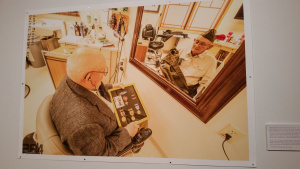Jose Angel Araguz's Blog, page 45
November 10, 2015
* new work up puerto del sol
Just a quick post to announce the release of Puerto del Sol’s latest issue which includes my poem “Meditation on White Hair.” Read my poem here.
This issue features fine work by, among others, Grace Shuyi Liew and Yaccaira Salvatierra, whose poem “Longing” won the 2015 Puerto del Sol Poetry contest. Check out the issue here.
Special thanks to Carmen Giménez Smith, Savannah Johnston, and everyone else on the Puerto staff for including my work in such a great issue!
See you Friday!
José


November 6, 2015
* ¡presente! with anne sexton
For my mother, born March 1902, died March 1959
and my father, born February 1900, died June 1959
Gone, I say and walk from church,
refusing the stiff procession to the grave,
letting the dead ride alone in the hearse.
It is June. I am tired of being brave.
We drive to the Cape. I cultivate
myself where the sun gutters from the sky,
where the sea swings in like an iron gate
and we touch. In another country people die.
My darling, the wind falls in like stones
from the whitehearted water and when we touch
we enter touch entirely. No one’s alone.
Men kill for this, or for as much.
And what of the dead? They lie without shoes
in their stone boats. They are more like stone
than the sea would be if it stopped. They refuse
to be blessed, throat, eye and knucklebone.
***
Dia de los Muertos – or Day of the Dead, a Mexican holiday focused on praying for and celebrating the dead – occurred this past Sunday and Monday, and I found myself moved for the first time to build an altar in honor of my father. Here’s what it looked like:
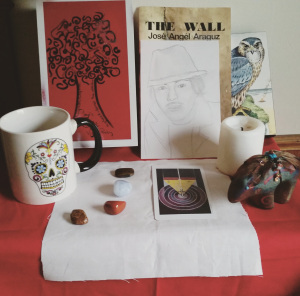
* dia de los muertos altar *
Included on the altar are a copy of my first chapbook, The Wall, and a pencil sketch of my father done by Andrea Schreiber. Also, I have my stones in a J formation to symbolize my being his namesake. I am unclear even now, days after, how to articulate what this meant for me. All I know is that the conversation that began with my poem “Gloves”, included i the chapbook, continues to this day, on the page and, now, in ritual and observance.
In the Sexton poem above, what moves me is how the speaker states she is “tired of being brave” as she moves from human action to human action, all the while emphasizing what it means to her to feel human. That being human means feeling “touch entirely.” This concept is contrasted with the stone-like state of the dead. The poems is called “The Truth the Dead Know,” and the speaker’s words come from an awareness, fascination, and even fear of not being able to share in that truth. And the dead, as represented in that stone-like description, are seemingly everywhere, even in the wind.
This meditation on Sexton’s poem and my own experience this week makes me think of something Norma Elia Cantu introduced me to at CantoMundo as she spoke before a reading. As she asked us to think of and express gratitude for those Latin@ writers and artists that came before us, she began to name them. Each name spoken was then followed by the exclamation of ¡Presente! As Norma went on calling names, others joined her, shouting out ¡Presente! I marveled at the act: this simple word, which is what one answers with during roll call, suddenly felt charged each time it was repeated. The very air became heated by the summoned presences everyone in the room was the conduit of.
Names, and words in general, have a power in recitation and reading. A poem can be where other voices and other truths cross over each other and mingle. As Norma and Sexton show us, whether it’s on a stage or on the page, words can be a place where we can “touch entirely.”
***
As I mentioned last week, the countdown to the December 1st release of my full-length collection, Everything We Think We Hear, has begun! Along with prose poems and flash fictions, the collection includes two haibuns, the Japanese poetic form that combines poetry and prose. As a kind of preview, here are links for “Birthdays” and “Walks” as published in Contemporary Haibun Online.
Happy presente-ing!
José


November 5, 2015
* new blog post at Cincinnati Review blog
Just a quick note to share my latest post for my Cincinnati Review blog column “What’s Poetry Got to Do with It?” Read the new post here.
This time around I discuss astrology, focusing on Pisces and Sei Shonagon. Along with expanding on ideas on astrology I’ve shared here on the Influence, this post can be seen as a kind of part 2 to my earlier Sei Shonagon post.
See you tomorrow!
Best,
José


October 30, 2015
* on the vine with denise levertov
Aware – Denise Levertov
When I found the door
I found the vine leaves
speaking among themselves in abundant
whispers.
My presence made them
hush their green breath,
embarrassed, the way
humans stand up, buttoning their jackets,
acting as if they were leaving anyway, as if
the conversation had ended
just before you arrived.
I liked
the glimpse I had, though,
of their obscure
gestures. I liked the sound
of such private voices. Next time
I’ll move like cautious sunlight, open
the door by fractions, eavesdrop
peacefully.
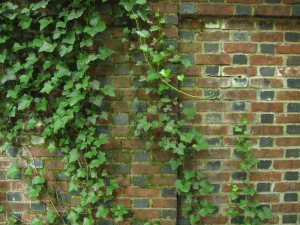
* uninvineted *
This week’s poem is by Denise Levertov, someone whose work I feel inspires the same kind of “cautious sunlight” approach to life and writing as is described above. Throughout the years, I’ve come back to her poems to learn again how to more inhabit my lines and line breaks. Note above the “abundance” of the third line, and how it scraps down to the one word “whispers.”
I have a friend who says that if you’re going to have one word stand alone on a line it better be the most important word in the poem. For me, “whispers” is a strong candidate for most important word, specifically because of what it means after I’ve read the poem and look at the words again. Structurally, my eye is drawn back to “whispers” and its two-syllable one line buddy “I liked.” The brevity of these two lines, how they are tucked into themselves much like the vine leaves of the poem, moves me to contemplate the whole poem further.
***
As I mentioned earlier this week, the release date for my upcoming collection, Everything We Think We Hear, is officially December 1st. I’ve got a couple of things in mind to share as we get closer to the date. Mas soon!
I’m also happy to announce that my chapbook The Divorce Suite will be published by Red Bird Chapbooks in 2016. More news on this project as it develops!
Happy vining!
José
October 27, 2015
* new work up at compose journal & news
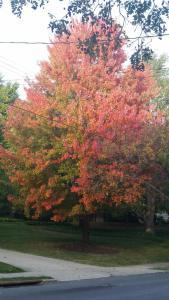
* raro, in red and orange *
Just a quick note to announce the release of Compose Journal’s Fall 2015 issue which includes my piece “Raro.” Read it here.
Compose Journal was also kind enough to let me contribute to their “The Story Behind (the Story)” feature. Find out about the origins of “Raro” – with specific insights into growing up in South Texas – here.
Special thanks to Suzannah Windsor for including my work in this issue! Check out the rest of the stellar issue – including work from Julie Brooks Barbour and Elizabeth Tannen – here.
***
As for the news this week, I am excited to announce that my full length collection of prose poems and flash fictions, Everything We Think We Hear, is officially set to be released on December 1st from Floricanto Press. Stay tuned for updates (including a sneak peak at the cover soon)! “Raro” is a good example of the kind personal focus dipped into in this upcoming collection.
See you Friday!
José


October 23, 2015
* traveling with sei shonagon
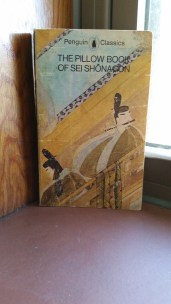
* pillow talk *
Last week, I made my way to Warrensburg, MO to participate in the Creative Writing and Innovative Pedagogies (CWIPs) conference sponsored by the Creative Writing Program at the University of Central Missouri. While there, I was part of the panel “Teaching Strange: The Impossible Art of Poetic Weirdness” along with Michelene Maylor, Alyse Bensel, Ryler Dustin, and chaired by Hadara Bar-Nadav. I presented my paper “Teaching the Fragmented Self from Sappho to Twitter” which briefly details the literature course I taught this past Spring that centered around fragmentary writing.
One of the texts we engaged with in the course was The Pillow Book of Sei Shonagon pictured above. I brought this book filled with lists, personal musings and observations of 11th Century Heian Japan along with me for the trip. Sei’s project was to write focused on every day things. Despite this outward ambition, much of her sensibility comes through, as can be seen in the following:
84. I Remember a Clear Morning
I remember a clear morning in the Ninth Month when it had been raining all night. Despite the bright sun, dew was still dripping from the chrysanthemums in the garden. On the bamboo fences and criss-cross hedges I saw tatters of spider webs; and where the threads were broken the raindrops hung on them like strings of white pearls. I was greatly moved and delighted.
As it became sunnier, the dew gradually vanished from the clover and the other plants where it had lain so heavily; the branches began to stir, then suddenly sprang up of their own accord. Later I described to people how beautiful it all was. What most impressed me was that they were not at all impressed.
The attention to detail as well as how those details strike one’s person as opposed to others is what made Sei’s book a perfect travel companion. As I finished rereading the book, I found Sei joining the ranks of my personal poet tribe that I carry around in my heart.

* carry on luggage *
Speaking of travel companions, Spoot somehow made his way into my luggage and joined as I familiarized myself with Warrensburg. Here is Spoot hanging out with me at the Old Drum Coffeehouse and Bakery. Other, non-beluga related sights included:
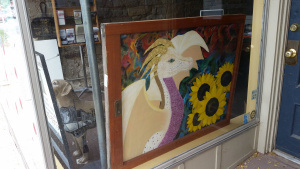
* dragon! *
This surprise dragon painting found further down Holden Street;

* con verse *
the requisite #ihavethisthingwithfloors photo;
and this piece from Devin Mitchell’s Veteran Vision Project which was on display at UCM’s Gallery of Art and Design. The exhibit focuses on the multiple identites veterans, young and old, live with. Find out more about this project here.
***
Special thanks to Phong Nguyen, Kathryn Nuernberger and everyone else involved in making the CWIPs conference a wonderful experience!
Happy Warrensburging!
José


October 19, 2015
* new work up at waxwing literary journal
Just a quick post to announce the release of the latest issue of Waxwing Literary Journal which includes my two poems “Mesquite” and “Luchadores.”
“Mesquite” comes from a time when I worked at creating myths about the everyday things around South Texas. Read it here.
“Luchadores” comes from hearing Cathy Park Hong share a new poem called “G.L.O.W.” (Gorgeous Ladies of Wrestling) and being inspired to revisit the little wrestler toys I played with as a kid. Read the poem here.
I am extremely grateful to have work in this issue of Waxwing. Check it out – including fine contributions by Wesley Rothman, Carrie Addington, and Erika T. Wurth among others – here.
See you Friday!
José


October 16, 2015
* review of natalie scenters-zapico’s the verging cities
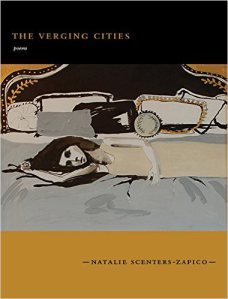
* the verging cities *
This week’s poem, “After I Read Your Obituary,” is by fellow CantoMundista Natalie Scenters-Zapico. The poem comes from her collection The Verging Cities which I was fortunate enough to get to review for The Volta Blog. In my review, I focus on the phrase “Let me learn you how” (found early in the collection) as a key to open up the powerful reading experience Scenters-Zapico has worked out for us.
This week’s poem provides an example of what I mean in the way the speaker’s experience with reading an obituary comes to life for her and the reader through an expanding conceit and attention to detail. As the poem develops, so does the speaker’s engagement with the reality of the dead and the worlds that engagement creates.
Read my review of Natalie Scenters-Zapico’s The Verging Cities here.
After I Read Your Obituary – Natalie Scenters-Zapico
you crawl into bed with my husband
and me. Your body is smaller
than I remember; I hush your voice
when you complain: the aloe-vera
in the pot is made of plastic.
Your breathing grows, a weed
in monsoon—you whisper: mother,
father, and sister fell open as birds
in their chairs when they were shot
at dinner. You show me how
you dove under the table, felt specks
of their blood on your lips before
seeing the scuffs on your father’s leather
shoes. You tell me, you buried
your family in the walls of an abandoned
restaurant, so you could travel to my home
to measure the depth of my new weather-proof
windows. With the tip of the plastic
succulent I rub your swollen ears.
I tell you: in this new country I am worse
than the city of thousands dead,
I am a wound red with iodine. My husband
wakes and I beg him for water
I’ve never known to taste so clean.
***
See you next Friday!
José


October 12, 2015
* new work at duende & apple valley review

* canicas *
Just a quick post to announce new work up at two stellar publications: Apple Valley Review & Duende!
The latest issue of Apple Valley Review includes my poems “Our Lady,” “Canicas,” and “Gentleman” along with some author’s notes on each of the poems. Read them here.
Big thanks to editor Leah Browning for taking in this special batch of poems.

* nada to see here *
Also, my poem “Zero Flirts with Nada” is included in the latest issue of Duende. Read it here.
Happy to be published in Duende alongside my CantoMundo fam, Juan Morales, whose work I have written about here on the Influence.
See you Friday!
José


October 9, 2015
* containing with edward hirsch & some news
I remember reading this week’s poem – “Special Orders” by Edward Hirsch – in a Borders back in 2008 when his book (of the same name) came out. Reading through the book, I marveled at Hirsch’s ability to navigate rich emotional territory through an engaging line. His ability to stack various worlds (work, memory, the heart) so that they live side by side left an impression on me that didn’t fully manifest itself until years later when I found myself working on the poems of my first chapbook, The Wall.
What moves me most revisiting the poem now is how this short lyric is able to charge its core word, “contain,” so that it holds so much when it comes up at the end.

* boxing *
Special Orders – Edward Hirsch
Give me back my father walking the halls
of Wertheimer Box and Paper Company
with sawdust clinging to his shoes.
Give me back his tape measure and his keys,
his drafting pencil and his order forms;
give me his daydreams on lined paper.
I don’t understand this uncontainable grief.
Whatever you had that never fit,
whatever else you needed, believe me,
my father, who wanted your business,
would squat down at your side
and sketch you a container for it.
***
Some news: I have just started as Assistant Editor at The Cincinnati Review and, as part of my duties, am beginning a column of sorts entitled “What’s Poetry Got to Do with It?” on the CR blog. Check out my first entry here.
Happy sketching!
José





